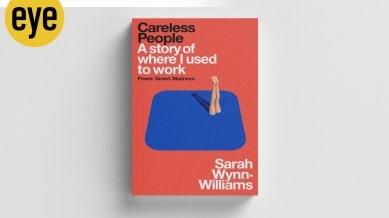‘Careless People’ review: Sarah Wynn-Williams exposes Big Tech’s moral void
In her explosive memoir, a former policy head reveals how Meta ignored warnings, enabled harm, and cosied up to authoritarian regimes.

Sarah Wynn-Williams, a lawyer and diplomat, had actively pitched for her job in the policy team at Facebook (before it became Meta). This was 2011, a time when the internet denoted promise and hope. She wanted to help “figure out the rules of the road for giant, globe spanning internet companies” and shape how millions would interact with social media.
The next decade saw this optimism unravel bit by bit. The platform that helped the Arab Spring, quickly circumvented regulations, seized upon the insecurities of teenagers, influenced election outcomes, promoted hate speech, threw its weight around and became the ultimate bully. In Careless People: A Story of Where I Used to Work, Williams, who was Facebook’s former Director of Global Public Policy, exposes and dissects the direction the company chose and the ripple effects of it all.
monthly limit of free stories.
with an Express account.
Like the careless people in The Great Gatsby — a book that critiques the excess of 1920s’ America — characters at Facebook are revealed to have “smashed up things and creatures and then retreated back into their money or their vast carelessness”.
Wynn-Williams shows, through incident after incident, that everything at Facebook — from the causes they sponsored to their dealings with The Communist Party of China (CCP) — was shaped by this carelessness.
This has of course landed Wynn-Williams in trouble. She was barred from publicising the memoir after Meta secured a ruling preventing her from doing so. Recently, a UK MP has claimed in parliament that Wynn-Williams was paying a fine of $50,000 every time she breached the order preventing her from criticising the company. The book puts the company’s reputation on the line at multiple levels.
Apart from Meta’s convenient dealings with governments, Wynn-Williams talks about a culture of harassment in the company. She claims she was fired after complaints against her former boss. Meta has denied these allegations and said she was fired for “poor performance and toxic behaviour”.
There is no way of knowing whether every bit of what Wynn-Williams has painstakingly recounted is fully accurate. But that is missing the point with this book, which is really a cautionary tale about Big Tech’s unregulated power and the lack of processes to address basic concerns.
Wynn-Williams gives an example of a 2014 riot in Myanmar that was triggered by Facebook posts. The junta had blocked Facebook as the situation spiralled. Facebook wanted to take these posts down. As per Wynn-Williams, the only person within the company who could speak Burmese and review content was a contractor in Dublin. The posts took over five hours to be taken down. The reason: the contractor was out having dinner and could not access his laptop. “None of the senior leaders… thought about this enough to put in place the kids of systems we’d need, in Myanmar or other countries. They apparently didn’t care. These were sins of omission. It wasn’t the things they did; it was the things they didn’t do,” she writes.
Wynn-William’s most scathing assessment of the company comes in the detailed account of how the company tried to enter the Chinese market and the price it was willing to pay for it. Wynn-Williams, who testified in front of the US Senate on the subject, claims the company built censorship tools to comb through people’s posts and was ready to store user data in China. She describes it as “white glove service to the CCP”.
These are all serious allegations but the book does not read like a news report or an investigation. The author has a way of infusing dark humour and sharp insight into these episodes. A delightful read, it is a mix of insider gossip with a vision for a better world.
An encounter Meta CEO Mark Zuckerberg allegedly had with President Barack Obama is a great example of this style. After Donald Trump came to power in 2016, Facebook was under the scanner for its targeted advertising. Wynn-Williams recounts how Obama reprimanded Zuckerberg for the company’s role in the elections. Zuckerberg, she says, was “taken to task on the role Facebook had played in the election and beyond”.
“He’s blindsided by Obama’s criticism and inflamed, reiterating again and again how Obama’s a lame duck, as if that is the salve to the wound… Under his anger, I can tell Mark’s genuinely hurt. I think he likes and respects Obama. He’s also completely unused to frank criticism from anyone more powerful than him. There are so few who fit the description anyway.” A casual retelling of the conflict in the mind of the man who made Facebook at 19 from a Harvard dorm.